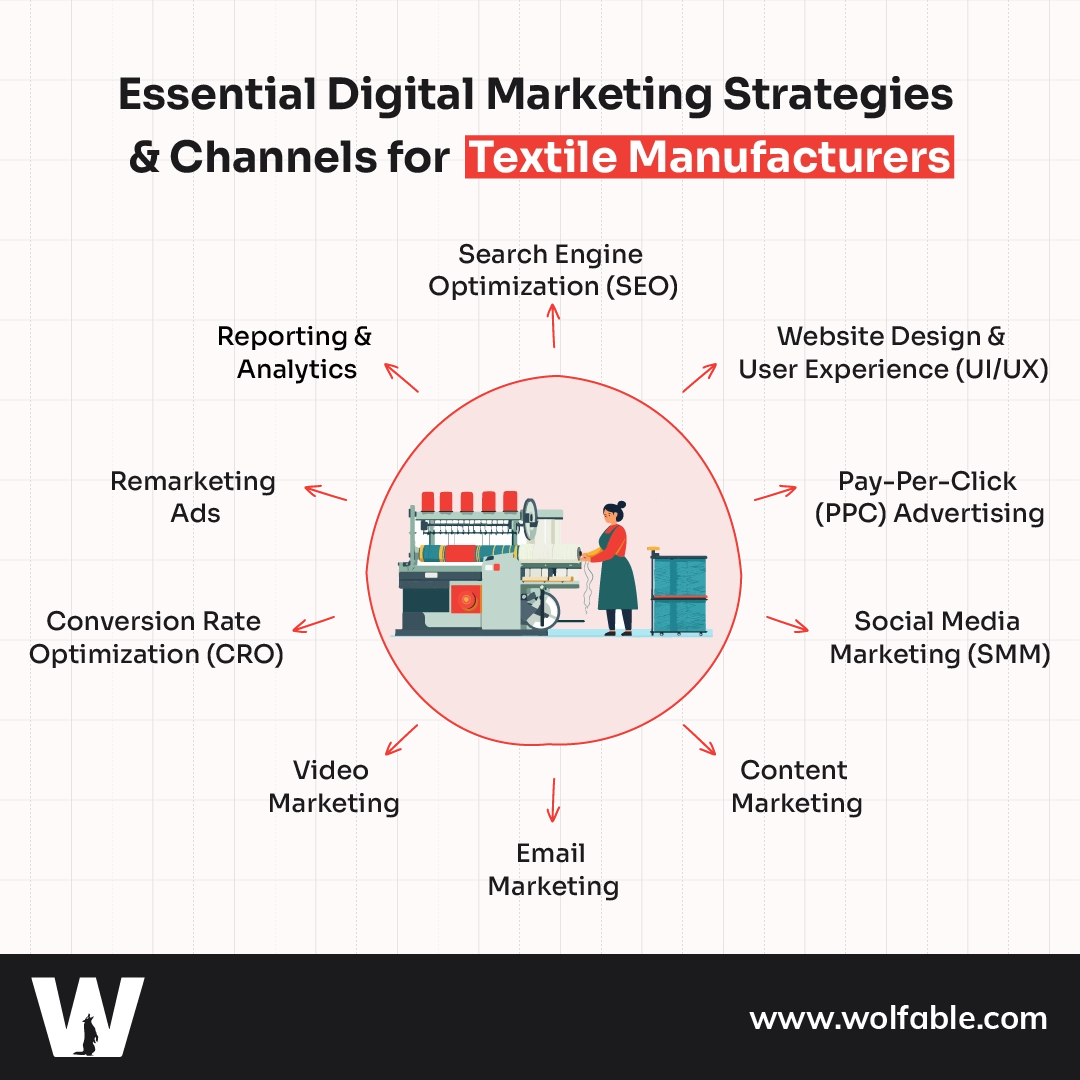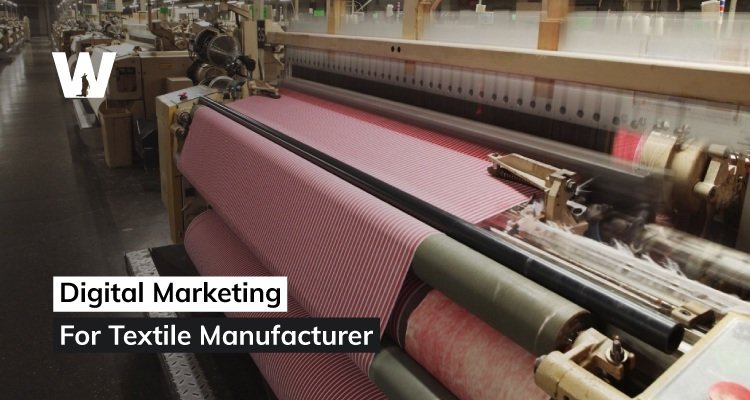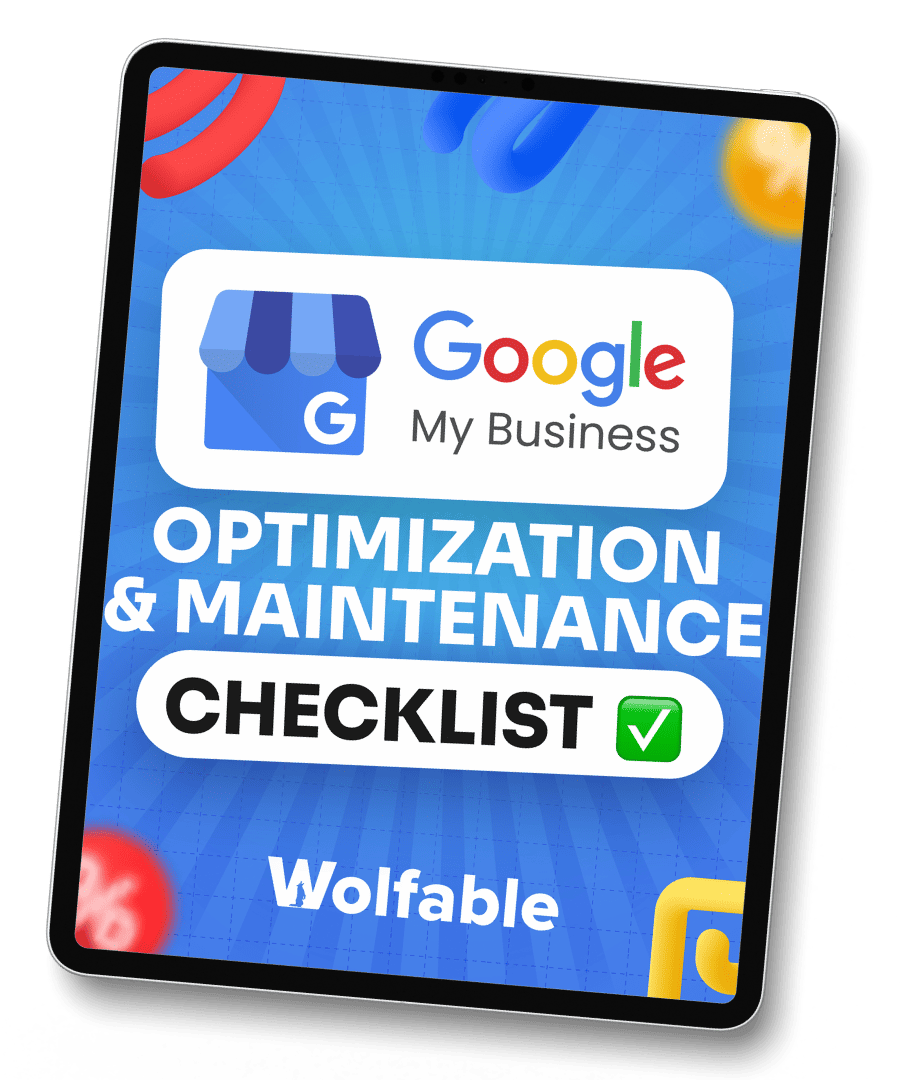Wraps up in 11 Minutes
The textile manufacturing industry is undergoing a significant digital transformation, driven by evolving consumer demands and global competition. With the industry valued at over $1.7 trillion globally, manufacturers must embrace innovative approaches to remain relevant in a tech-driven era. The integration of digital tools, from automation in production to digital marketing strategies, is shaping the future of the textile industry. By leveraging these advancements, textile manufacturers can optimize operations, expand market reach, and cater to diverse customer needs effectively.
Understanding the Textile Manufacturing Industry’s Digital Transformation
Textile manufacturing has traditionally relied on conventional methods to connect with distributors and buyers. However, the digital revolution has introduced advanced tools like AI, IoT, and blockchain to enhance efficiency and transparency. Similarly, marketing for textile manufacturers is no longer confined to trade shows and print ads; it now thrives online. Platforms like Instagram, Pinterest, and LinkedIn allow businesses to showcase their products to a global audience while improving engagement and visibility. This transformation ensures that manufacturers stay competitive in an ever-changing marketplace.
Why Digital Marketing is the Key to Competing in the Modern Textile Market
Digital marketing offers textile manufacturers a cost-effective and measurable way to connect with both B2B and B2C audiences. Over 87% of B2B buyers start their purchasing journey online, making a strong digital presence essential. Strategies like SEO, social media marketing, and PPC ads help manufacturers position themselves as industry leaders. Furthermore, tools like email marketing and remarketing ads allow businesses to nurture leads, ensuring long-term relationships with customers. By utilizing digital marketing, textile manufacturers can not only drive sales but also build a lasting brand reputation in the global market.
Why Textile Manufacturers Need Digital Marketing
Digital marketing has become indispensable for textile manufacturers aiming to thrive in an increasingly competitive industry. With the global textile market projected to reach $350 billion by 2030, businesses need modern strategies to capture their share. A robust digital presence enables textile manufacturers to reach broader markets, build brand authority, and connect with both B2B and B2C audiences. By leveraging tools like SEO and social media, manufacturers can showcase their products and attract potential buyers more effectively than traditional methods.
- The Shift from Traditional to Digital Marketing in Textiles:
Traditional marketing avenues like trade shows, print catalogs, and word-of-mouth remain valuable but are no longer sufficient. Over 70% of B2B buyers now research online before making purchase decisions, highlighting the importance of digital marketing. Textile manufacturers can leverage platforms like Google Ads and LinkedIn to connect with buyers at every stage of their purchasing journey. Additionally, digital marketing offers measurable ROI, making it easier for textile businesses to assess the effectiveness of campaigns. - Adapting to Evolving Buyer Behaviors and Preferences:
Buyer preferences have shifted significantly in recent years, with most customers expecting seamless online experiences. Research shows that 76% of consumers prefer brands that offer personalized digital interactions. Textile manufacturers can adapt by using data-driven marketing strategies to Customize content and campaigns to specific buyer needs. From showcasing sustainable practices to providing online product catalogs, digital marketing allows textile businesses to align with evolving demands while building long-term customer loyalty.
What Are the Core Principles of Digital Marketing for Textile Manufacturers?
To excel in the highly competitive textile industry, manufacturers must adopt core digital marketing principles that focus on customer engagement and streamlined strategies. At its foundation, digital marketing for textile manufacturers revolves around understanding buyer needs, leveraging data for decision-making, and maintaining consistent messaging across all online channels. These principles ensure that marketing efforts align with business objectives, creating a strong foundation for growth in the ever-evolving digital landscape.
- Building a Buyer-Centric Digital Strategy :
A buyer-centric approach is crucial for textile manufacturers to connect with modern consumers. Studies show that 73% of B2B buyers expect manufacturers to deliver personalized online experiences. To meet this expectation, textile manufacturers should define their buyer personas by identifying target markets, industries, and pain points. For instance, focusing on sustainability can attract eco-conscious clients, while highlighting product durability appeals to large-scale industrial buyers. Creating content that speaks directly to these needs fosters trust and improves conversions. - Integrating Digital Efforts Across Marketing Channels:
Successful digital marketing for textile manufacturers requires integrating efforts across multiple channels, including SEO, social media, PPC, and email marketing. Consistency across these platforms ensures a unified brand message and stronger customer recall. For example, a manufacturer promoting a new eco-friendly textile line can use blog content to educate buyers, social media to generate awareness, and email campaigns to nurture leads. By synchronizing efforts, manufacturers can achieve higher engagement rates, with research showing that omnichannel campaigns yield 18.9% more revenue compared to single-channel approaches.
Essential Digital Marketing Strategies and Channels for Textile Manufacturers
Digital marketing has become a game-changer for textile manufacturers, offering powerful tools to increase visibility, attract buyers, and drive growth. By focusing on targeted strategies like
Search Engine Optimization (SEO), manufacturers can position themselves as industry leaders. SEO enables textile manufacturers to improve their online presence, connect with regional and international buyers, and compete effectively in the global marketplace.

1. Search Engine Optimization (SEO)
For textile manufacturers, SEO is a crucial strategy to increase online visibility and connect with potential buyers. With over 68% of online experiences starting with a search engine, optimizing your website ensures that your business ranks higher on search results. By focusing on SEO, textile manufacturers can attract more traffic, showcase their offerings, and build a stronger digital presence.
- Research and Target Industry-Specific Keywords
Keyword research is the backbone of effective SEO for textile manufacturers. Identifying terms like "bulk textile suppliers," "custom fabric manufacturers," or "sustainable textiles" helps attract buyers actively searching for these services. Tools like Google Keyword Planner and SEMrush provide insights into search volume and competition for specific keywords. By integrating these terms into your content, you ensure your business is visible to relevant audiences, driving organic leads. - Enhance On-Page and Off-Page SEO for Textile Websites
On-page SEO involves optimizing elements like meta titles, headers, and alt tags with industry-specific keywords. For instance, a product page for organic cotton fabrics should include keywords such as "organic cotton textile manufacturer." Off-page SEO, like earning backlinks from textile industry blogs or directories, enhances domain authority. Websites with quality backlinks can see a 34% boost in search engine rankings, making it an essential strategy. - Use Local SEO to Attract Regional Buyers
Local SEO helps textile manufacturers connect with nearby buyers searching for terms like "textile manufacturers near me" or "local fabric suppliers." Creating a Google Business Profile with updated information, including location, contact details, and reviews, ensures visibility in local search results. Regional keywords such as "Ahmedabad textile manufacturers" or "Bangalore bulk fabric suppliers" enhance your reach, helping you dominate local markets. Additionally, encouraging satisfied customers to leave reviews boosts credibility and attracts more regional business opportunities.
2. Website Design and User Experience (UI/UX)
For textile manufacturers, a well-designed website is crucial for converting visitors into customers. With 88% of online consumers less likely to return to a site after a bad user experience, investing in a user-friendly and visually engaging website is essential. A clean design that highlights your products, services, and industry expertise creates a strong first impression and builds trust with potential buyers.
- Develop a User-Friendly and Visually Engaging Website
A user-friendly website for a textile manufacturer should have easy navigation, clear product categories, and an intuitive layout. Studies show that 94% of first impressions are design-related, so it's important to use high-quality images of your fabrics and textiles while ensuring that your website’s layout is organized. A simple, visually appealing design with minimal distractions will keep visitors engaged longer, increasing the chances of conversion. - Ensure Mobile Optimization for Global Reach
With over 50% of global website traffic coming from mobile devices, mobile optimization is non-negotiable for textile manufacturers aiming to reach a global audience. Ensuring your website is responsive, loads quickly on mobile devices, and offers a seamless browsing experience helps attract international buyers. For textile businesses looking to expand globally, this step is crucial for tapping into a broader market and staying competitive. - Include Features like Online Quoting, Payment Options, and Chatbots
Adding features like online quoting, payment options, and chatbots enhances the overall user experience. Textile manufacturers can streamline the purchasing process by providing quick, automated quotes and easy payment methods, which increase conversion rates. According to 78% of online consumers, quick response time to queries via chatbots or live chat enhances customer satisfaction, making it an effective tool for textile manufacturers to engage visitors and close sales faster.
3. Pay-Per-Click (PPC) Advertising
PPC advertising is a highly effective strategy for textile manufacturers looking to drive immediate traffic to their websites. By creating targeted Google Ads campaigns focused on textile-related keywords, businesses can attract relevant leads actively searching for fabrics, textiles, or manufacturing solutions. With 45% of businesses relying on PPC to generate a significant portion of their sales, investing in a well-structured PPC strategy can lead to faster conversions and a high return on investment for textile manufacturers.
- Create Google Ads Campaigns Focused on Textile Keywords
To reach potential buyers, textile manufacturers should create Google Ads campaigns centered around high-intent keywords like “custom textile manufacturer” or “wholesale fabric suppliers.” Studies show that 65% of clicks on search ads happen when businesses target the right keywords. By bidding on specific, industry-related terms, textile manufacturers ensure their ads are displayed to users who are ready to make purchasing decisions, driving qualified traffic to their websites. - Utilize Google Display Ads to Increase Brand Awareness
Google Display Ads are an excellent way for textile manufacturers to increase brand awareness across the internet. Displaying banner ads on relevant websites within the textile and fashion industry helps expose your brand to a broader audience. With over 90% of internet users reached by Google’s Display Network, textile businesses can build brand recognition and keep their products top-of-mind for potential customers as they browse online. - LinkedIn Ads for Targeting B2B Buyers
LinkedIn Ads are a powerful tool for textile manufacturers targeting B2B buyers. As a platform frequented by decision-makers and industry professionals, LinkedIn offers a unique opportunity to reach textile wholesalers, suppliers, and corporate buyers. According to LinkedIn’s data, 80% of B2B leads come from the platform, making it an ideal space for textile manufacturers to promote their products, services, and manufacturing capabilities to a highly relevant audience. By targeting specific industries or job titles, businesses can ensure their ads are seen by key decision-makers.
4. Social Media Marketing (SMM)
Social media marketing is an essential tool for textile manufacturers looking to build brand awareness, connect with potential clients, and showcase their products. With over 4.5 billion social media users globally, platforms like Instagram, Pinterest, LinkedIn, and Facebook offer powerful opportunities to engage with both B2B and B2C audiences. A well-rounded social media strategy can help textile manufacturers boost visibility and drive sales, making it a key component of their digital marketing efforts.
- Build a Presence on Instagram and Pinterest for Visual Appeal
For textile manufacturers, platforms like Instagram and Pinterest are perfect for showcasing the visual beauty and quality of their fabrics and products. According to Instagram’s data, over 60% of users discover new products on the platform, which makes it ideal for textile manufacturers to showcase their textiles through high-quality images and videos. Pinterest is another powerful platform, especially for industries like fashion and home décor, where consumers often search for textile inspiration. Building a strong presence on these platforms can attract both individual consumers and business buyers, highlighting the unique designs and textures your textile company offers. - Leverage LinkedIn for B2B Engagement and Networking
LinkedIn remains the top platform for B2B marketing, and textile manufacturers can use it to engage with industry professionals, suppliers, and potential partners. With 90% of B2B marketers using LinkedIn to distribute content, textile manufacturers can share case studies, blog posts, and product updates to build authority in the industry. Networking through LinkedIn groups and participating in relevant discussions can help textile manufacturers strengthen relationships with suppliers and distributors, ultimately driving more business opportunities. - Run Paid Social Media Campaigns to Target Specific Audiences
Paid social media campaigns allow textile manufacturers to reach highly targeted audiences, increasing the chances of conversion. By using Facebook and Instagram’s advanced targeting features, textile companies can focus their ads on specific demographics, interests, and behaviors. For example, you could target fashion designers or retail buyers interested in sustainable fabrics. Research shows that 66% of businesses report generating leads via paid social campaigns, making it an effective way for textile manufacturers to drive traffic to their websites and increase sales.
5. Content Marketing
Content marketing is a powerful strategy for textile manufacturers looking to position themselves as thought leaders, build trust with their audience, and enhance their SEO efforts. By creating valuable and relevant content, manufacturers can engage with potential clients, educate them, and guide them through the buyer’s journey. Studies show that 70% of consumers prefer learning about a company through articles and blogs rather than traditional ads, making content a critical part of any textile marketing strategy.
- Publish Educational Blogs on Textile Trends and Innovations
Publishing educational blogs about the latest textile trends and innovations helps textile manufacturers stay relevant and attract organic traffic. For example, blogs that highlight sustainable fabrics or new production technologies can showcase the company’s expertise and appeal to environmentally conscious buyers. According to a HubSpot study, companies that publish blogs regularly receive 55% more website visitors and 67% more leads. Textile manufacturers can use these insights to write about industry trends, like the rise of smart fabrics or advancements in textile recycling, which will resonate with both B2B and B2C audiences. - Use Whitepapers and Case Studies to Build Authority
Whitepapers and case studies are excellent tools for building authority and trust in the textile industry. By sharing in-depth reports on manufacturing processes, sustainability efforts, or successful partnerships, textile manufacturers can demonstrate their expertise. A case study showcasing a successful partnership with a fashion brand or retailer, for instance, can highlight the manufacturer's ability to meet high-quality standards and deadlines. According to Content Marketing Institute, 76% of B2B buyers say they read case studies before making a purchasing decision, making them an essential resource for converting leads into customers. - Share Customer Success Stories
Sharing customer success stories is an effective way for textile manufacturers to showcase their products in real-world applications. For example, a textile manufacturer could highlight how their durable fabrics were used in a major sporting event or fashion show. These success stories not only build credibility but also offer social proof that helps potential customers feel more confident in their decision-making process. According to Nielsen, 92% of consumers trust recommendations from others, making customer testimonials and success stories a critical aspect of content marketing for textile manufacturers.
6. Email Marketing
Email marketing is a powerful tool for textile manufacturers, with an impressive ROI of $42 for every $1 spent. By crafting personalized email campaigns, manufacturers can directly engage with their buyers, distributors, and existing customers. This allows textile manufacturers to stay connected, drive sales, and nurture long-term relationships.
- Develop Personalized Campaigns for Buyers and Distributors
Personalized email campaigns help textile manufacturers target specific segments of their audience. For instance, offering exclusive deals on sustainable fabrics to eco-conscious buyers or sending bulk discounts to distributors can significantly boost engagement. 80% of consumers are more likely to purchase when they receive Customized offers, making personalized emails essential for conversion. - Send Regular Updates on New Products, Trends, and Promotions
Sending regular updates about new products and trends helps textile manufacturers stay relevant. For example, monthly newsletters can inform customers about the latest fabric collections or seasonal promotions. 61% of B2B buyers are more likely to engage after receiving informative emails, which highlights the importance of timely and relevant updates.
7. Video Marketing
Video marketing is a compelling way for textile manufacturers to connect with their audience and showcase their expertise. Studies show that 84% of consumers are convinced to purchase a product after watching a brand’s video. Engaging and informative videos can effectively highlight the manufacturer’s unique offerings and build trust with buyers.
- Showcase Manufacturing Processes and Quality Standards
Behind-the-scenes videos showcasing advanced manufacturing techniques and strict quality controls can instill confidence in potential buyers. For example, a video demonstrating how high-quality fabrics are tested for durability can appeal to both B2B and B2C customers. These visuals help establish a textile manufacturer as a reliable and innovative supplier. - Create Tutorials and How-To Guides for End Users
Educational videos, such as tutorials on caring for specific fabric types or guides on incorporating textiles into designs, add value for end users. A textile manufacturer can create simple "how-to" content, such as washing tips for delicate materials, to engage their audience. Such videos are highly shareable and improve brand visibility. - Share Video Testimonials from Satisfied Clients
Client testimonials in video format are highly persuasive, as they showcase real-world success stories. For instance, a distributor’s testimonial about consistent quality and timely delivery can resonate with potential buyers. 72% of customers say positive reviews and testimonials increase their trust in a business, making this strategy crucial for textile manufacturers.
8. Conversion Rate Optimization (CRO)
Conversion Rate Optimization (CRO) is essential for textile manufacturers to turn website visitors into paying customers. Even a 1% increase in conversion rates can lead to significant revenue growth in a competitive market. By focusing on user experience and targeted strategies, textile manufacturers can boost online sales and generate more leads.
- Optimize Product Pages to Convert Website Visitors into Buyers
Product pages should provide clear, concise information and high-quality images to encourage purchases. Textile manufacturers can enhance these pages by adding fabric specifications, certifications, and customer reviews. For instance, displaying trust badges and offering bulk order discounts can improve buyer confidence and drive conversions. - Test and Refine Landing Pages for Lead Generation
Regularly testing and refining landing pages can significantly improve lead generation for textile manufacturers. A/B testing different headlines, CTAs, or layouts ensures better engagement. According to research, optimized landing pages can increase conversion rates by up to 220%, making them a important component of any CRO strategy.
9. Remarketing Ads
Remarketing ads are a powerful way for textile manufacturers to re-engage potential buyers who previously interacted with their website or social media. Studies show that retargeted customers are 70% more likely to convert, making it an essential strategy to maximize ROI. These ads keep your brand top-of-mind for buyers evaluating options.
- Target Interested Buyers with Retargeting Campaigns on Google and Social Media
Textile manufacturers can use Google and social media platforms like Facebook or Instagram to run targeted retargeting campaigns. For example, if a buyer explored your fabric catalog but didn’t make a purchase, showing personalized ads about discounts or featured products can entice them back. Retargeting is especially effective for converting B2B buyers, as the buying cycle often requires multiple touchpoints.
10. Reporting and Analytics
Effective reporting and analytics are essential for textile manufacturers to measure the success of their digital marketing strategies. By tracking key metrics and analyzing campaign performance, businesses can make data-driven decisions to optimize their efforts and maximize ROI.
- Monitor Campaign Performance with Google Analytics
For a textile manufacturer, analyzing data is key to optimizing marketing efforts. Using Google Analytics, you can track metrics like website traffic, bounce rates, and conversions. For instance, if your cotton fabric product pages have high traffic but low conversions, it may signal the need for better call-to-action buttons or pricing clarity. These insights ensure your marketing strategy is data-driven and effective. - Analyze ROI and Adjust Strategies as Needed
Evaluating ROI helps textile manufacturers ensure their marketing budget delivers results. By analyzing metrics such as cost per acquisition (CPA) and return on ad spend (ROAS), you can pinpoint which campaigns yield the best outcomes. For example, if social media ads outperform email campaigns, reallocate funds accordingly. This approach keeps your strategies flexible and aligned with business goals.
How to Create a Winning Digital Marketing Strategy for Textile Manufacturers
Creating a winning digital marketing strategy is essential for textile manufacturers to thrive in today’s competitive landscape. By combining thorough research, clear goals, and the right tools, manufacturers can effectively engage their audience, drive sales, and build a strong online presence.
- Conduct Market Research and Competitor Analysis
Market research is the backbone of a successful digital strategy for textile manufacturers. Analyze industry trends, buyer behavior, and competitors’ strategies to identify gaps and opportunities. For example, studying emerging demand for sustainable textiles can help position your brand as an eco-friendly leader. - Define Buyer Personas for B2B and B2C Audiences
Creating detailed buyer personas ensures your campaigns address the unique needs of both B2B buyers, such as retailers, and B2C end customers. For instance, a B2B persona may value bulk pricing and delivery efficiency, while B2C buyers might prioritize fabric quality and aesthetics. - Set SMART Goals for Marketing Campaigns
Setting Specific, Measurable, Achievable, Relevant, and Time-bound (SMART) goals keeps marketing efforts focused and effective. For example, aim to increase website traffic by 30% over six months or generate 20 new leads per week through targeted campaigns. - Develop a Roadmap for Implementation
A well-defined roadmap outlines actionable steps for implementing your digital strategy, from SEO improvements to launching PPC ads. This ensures textile manufacturers can execute campaigns efficiently and track progress at every stage. - Use Marketing Automation Tools to Streamline Processes
Marketing automation tools like HubSpot or Mailchimp help textile manufacturers save time and boost efficiency. Automate email campaigns, lead scoring, and data collection to focus more on strategic growth rather than repetitive tasks.
Measuring Digital Marketing Success for Textile Manufacturers
Measuring digital marketing success is crucial for textile manufacturers to ensure their strategies deliver tangible results. By defining clear metrics, leveraging analytical tools, and optimizing campaigns, manufacturers can refine their approach and maximize ROI. This process ensures every marketing effort aligns with business goals.
- Define KPIs for Traffic, Engagement, and Conversions
Key Performance Indicators (KPIs) help textile manufacturers track the success of their digital marketing efforts. Metrics like website traffic, social media engagement, and conversion rates provide insight into campaign performance. For instance, tracking a 20% increase in monthly website visitors can indicate improved SEO strategies targeting textile buyers. - Use Tools Like Google Analytics and SEO Platforms
Google Analytics is a powerful tool for monitoring website activity and user behavior, offering textile manufacturers data on bounce rates and popular product pages. SEO platforms like SEMrush or Ahrefs can help evaluate keyword rankings and competitor performance. These tools ensure your textile business stays ahead in search engine visibility. - Conduct A/B Testing to Optimize Campaigns
A/B testing allows textile manufacturers to experiment with different headlines, images, or call-to-action buttons. For example, testing two landing page designs can help identify which layout drives more inquiries. Regular testing helps fine-tune marketing strategies and achieve higher ROI from digital campaigns.
Best Digital Marketing Automation Tools for Textile Manufacturers
In today’s fast-paced textile industry, digital marketing automation is crucial for staying ahead of the competition. Tools like HubSpot and Marketo can streamline marketing campaigns, improve lead generation, and automate repetitive tasks. These platforms help textile manufacturers save time while enhancing customer engagement through personalized content, ultimately increasing conversions
- CRM Tools for Managing Leads and Clients
Customer Relationship Management (CRM) tools are essential for textile manufacturers looking to nurture leads and maintain strong client relationships. Platforms like Salesforce and Zoho CRM offer advanced features to track client interactions, manage sales pipelines, and enhance communication. A well-managed CRM ensures textile manufacturers can offer Customized solutions, boosting client retention and satisfaction. - Tools for Social Media Scheduling and Email Automation
For textile manufacturers, maintaining an active social media presence and engaging email campaigns are important for brand awareness. Tools like Hootsuite and Mailchimp can automate posts across multiple platforms and send personalized emails to targeted audiences. With these tools, textile manufacturers can maintain consistent communication, drive traffic, and convert leads into loyal customers, improving overall ROI.
How Much Should Textile Manufacturers Invest in Digital Marketing?
The amount textile manufacturers should invest in digital marketing varies based on business size and goals. According to a 2023 report by Statista, companies typically allocate 7-10% of their annual revenue to marketing. For textile manufacturers, this investment ensures they stay competitive in an increasingly digital landscape by increasing online visibility and driving sales.
- Key Factors Influencing Budget Allocation Several factors influence how much textile manufacturers should allocate to their digital marketing budget. Key considerations include business size, target market, and marketing objectives. For example, textile manufacturers targeting international markets might need to allocate more to digital advertising and SEO to maximize global reach, while local manufacturers may focus more on social media and content marketing.
- Recommendations for Small, Medium, and Large Manufacturers For small textile manufacturers, a modest investment of 3-5% of revenue can make a significant impact by focusing on low-cost digital tactics like social media and SEO. Medium-sized manufacturers should consider allocating 6-8% to explore paid ads and advanced email campaigns. Larger manufacturers, with broader marketing goals, may need to allocate 10-12% to sustain growth and expand into new digital channels like video marketing and influencer partnerships.
Case Studies of Successful Digital Marketing in the Textile Industry
The textile industry has seen tremendous growth by embracing digital marketing strategies. A notable example is Lenzing, an Austrian textile manufacturer known for sustainable fibers. By leveraging content marketing and social media, Lenzing effectively educated consumers on the benefits of eco-friendly textiles. This approach boosted their online engagement by 40%, and their social media presence grew substantially, allowing them to expand into new markets.
Another successful case is Cotton On, an Australian textile retailer that used paid digital ads and influencer marketing to increase sales. Their targeted Facebook and Instagram campaigns resulted in a 20% increase in conversion rates, allowing the company to reach a global audience. By using data-driven insights, Cotton On refined its campaigns, providing a personalized experience that resonated with consumers and drove significant growth for the brand.
A third example is Tencel by Lenzing, which used a mix of influencer collaborations and video marketing to position their sustainable textiles as a premium product. Their strategy led to a 50% increase in website traffic, helping them capture the attention of eco-conscious consumers and scaling their operations effectively in both B2B and B2C sectors. These digital strategies have been game-changers for textile manufacturers looking to expand their global footprint.
Why Choose Wolfable for Textile Manufacturing Digital Marketing?
Wolfable stands out as a leading digital marketing agency, offering specialized services for textile manufacturers. With years of experience in both B2B and B2C marketing, Wolfable understands the unique needs of textile brands, whether they’re focusing on wholesale or direct-to-consumer markets. Our Customized strategies ensure that textile manufacturers can effectively reach their target audience and drive growth across digital platforms.
- Industry Expertise in B2B and B2C Marketing Wolfable’s deep industry expertise in both B2B and B2C digital marketing for textile manufacturers sets us apart. By combining advanced SEO tactics with content marketing, we ensure textile manufacturers increase their visibility in both sectors. Our campaigns are designed to engage trade clients while building a strong direct relationship with consumers, providing a comprehensive approach that accelerates brand growth.
- Proven Track Record of Successful Campaigns With a proven track record of successful campaigns, Wolfable has helped textile manufacturers improve their digital presence and generate leads. Our data-driven approach consistently delivers measurable results. By optimizing digital strategies, we empower textile manufacturers to scale their operations efficiently and achieve long-term success.
- Customized Solutions for Textile Manufacturers At Wolfable, we recognize that every textile manufacturer has unique goals and challenges. That’s why we offer customized solutions Customized to the specific needs of your business. Whether you're a local textile brand or a global manufacturer, our strategies are designed to maximize ROI through targeted digital campaigns, SEO optimization, and social media engagement that resonate with your ideal audience.
- A Leading Digital Marketing Agency for Global and Regional Textile Brands Wolfable’s expertise extends beyond regional markets to global textile brands looking to expand their reach. Our international experience allows us to navigate complex global digital marketing strategies, helping textile manufacturers gain visibility in competitive markets. From website optimization to cross-border e-commerce, Wolfable is the trusted partner for textile brands aiming for global success.
Conclusion
Digital marketing is no longer a luxury but a necessity for textile manufacturers in today’s competitive landscape. It plays an important role in enhancing brand visibility, driving customer engagement, and staying ahead of industry trends. A well-structured digital marketing strategy can transform how your textile business connects with potential clients, showcasing your expertise and unique offerings.
With the textile industry embracing digital transformation, leveraging tools like SEO, social media marketing, and data analytics can significantly improve your online presence and ROI. Collaborating with Wolfable - Best Manufacturing Digital Marketing Agency ensures you gain access to customized strategies that drive measurable results.
Ultimately, digital marketing is about more than just promotions; it’s about building a strong and trusted brand presence in the digital space. By partnering with Wolfable, you can confidently position your textile business for sustained growth and success in the evolving marketplace.









